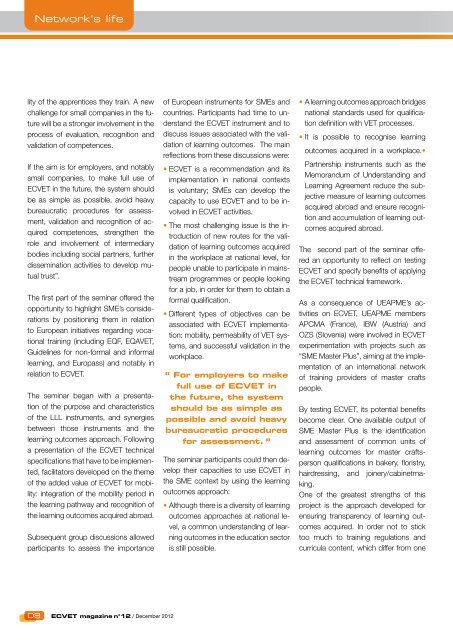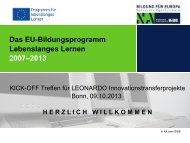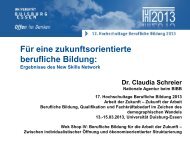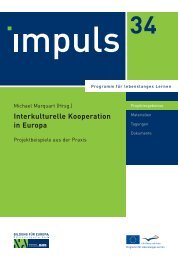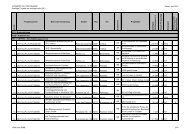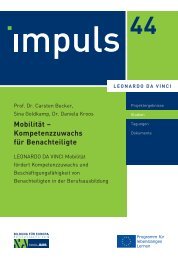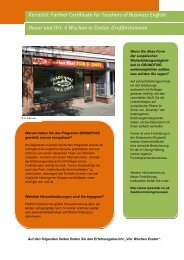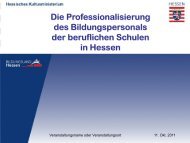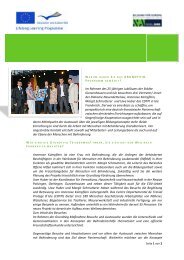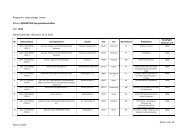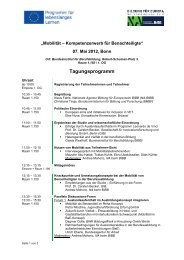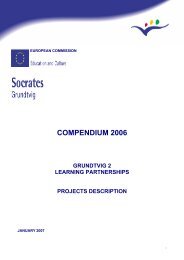Create successful ePaper yourself
Turn your PDF publications into a flip-book with our unique Google optimized e-Paper software.
Network's life<br />
lity of the apprentices they train. A new<br />
challenge for small companies in the future<br />
will be a stronger involvement in the<br />
process of evaluation, recognition and<br />
validation of competences.<br />
If the aim is for employers, and notably<br />
small companies, to make full use of<br />
ECVET in the future, the system should<br />
be as simple as possible, avoid heavy<br />
bureaucratic procedures for assessment,<br />
validation and recognition of acquired<br />
competences, strengthen the<br />
role and involvement of intermediary<br />
bodies including social partners, further<br />
dissemination activities to develop mutual<br />
trust”.<br />
The first part of the seminar offered the<br />
opportunity to highlight SME’s considerations<br />
by positioning them in relation<br />
to European initiatives regarding vocational<br />
training (including EQF, EQAVET,<br />
Guidelines for non-formal and informal<br />
learning, and Europass) and notably in<br />
relation to ECVET.<br />
The seminar began with a presentation<br />
of the purpose and characteristics<br />
of the LLL instruments, and synergies<br />
between those instruments and the<br />
learning outcomes approach. Following<br />
a presentation of the ECVET technical<br />
specifications that have to be implemented,<br />
facilitators developed on the theme<br />
of the added value of ECVET for mobility:<br />
integration of the mobility period in<br />
the learning pathway and recognition of<br />
the learning outcomes acquired abroad.<br />
Subsequent group discussions allowed<br />
participants to assess the importance<br />
08 ECVET magazine n°12 / December 2012<br />
of European instruments for SMEs and<br />
countries. Participants had time to understand<br />
the ECVET instrument and to<br />
discuss issues associated with the validation<br />
of learning outcomes. The main<br />
reflections from these discussions were:<br />
• ECVET is a recommendation and its<br />
implementation in national contexts<br />
is voluntary; SMEs can develop the<br />
capacity to use ECVET and to be involved<br />
in ECVET activities.<br />
• The most challenging issue is the introduction<br />
of new routes for the validation<br />
of learning outcomes acquired<br />
in the workplace at national level, for<br />
people unable to participate in mainstream<br />
programmes or people looking<br />
for a job, in order for them to obtain a<br />
formal qualification.<br />
• Different types of objectives can be<br />
associated with ECVET implementation:<br />
mobility, permeability of VET systems,<br />
and successful validation in the<br />
workplace.<br />
“ For employers to make<br />
full use of ECVET in<br />
the future, the system<br />
should be as simple as<br />
possible and avoid heavy<br />
bureaucratic procedures<br />
for assessment. ”<br />
The seminar participants could then develop<br />
their capacities to use ECVET in<br />
the SME context by using the learning<br />
outcomes approach:<br />
• Although there is a diversity of learning<br />
outcomes approaches at national level,<br />
a common understanding of learning<br />
outcomes in the education sector<br />
is still possible.<br />
• A learning outcomes approach bridges<br />
national standards used for qualification<br />
definition with VET processes.<br />
• It is possible to recognise learning<br />
outcomes acquired in a workplace.•<br />
Partnership instruments such as the<br />
Memorandum of Understanding and<br />
Learning Agreement reduce the subjective<br />
measure of learning outcomes<br />
acquired abroad and ensure recognition<br />
and accumulation of learning outcomes<br />
acquired abroad.<br />
The second part of the seminar offered<br />
an opportunity to reflect on testing<br />
ECVET and specify benefits of applying<br />
the ECVET technical framework.<br />
As a consequence of UEAPME’s activities<br />
on ECVET, UEAPME members<br />
APCMA (France), IBW (Austria) and<br />
OZS (Slovenia) were involved in ECVET<br />
experimentation with projects such as<br />
“SME Master Plus”, aiming at the implementation<br />
of an international network<br />
of training providers of master crafts<br />
people.<br />
By testing ECVET, its potential benefits<br />
become clear. One available output of<br />
SME Master Plus is the identification<br />
and assessment of common units of<br />
learning outcomes for master craftsperson<br />
qualifications in bakery, floristry,<br />
hairdressing, and joinery/cabinetmaking.<br />
One of the greatest strengths of this<br />
project is the approach developed for<br />
ensuring transparency of learning outcomes<br />
acquired. In order not to stick<br />
too much to training regulations and<br />
curricula content, which differ from one


